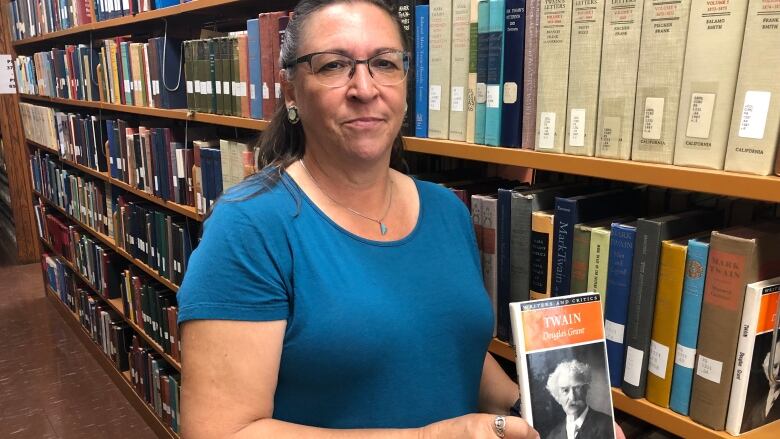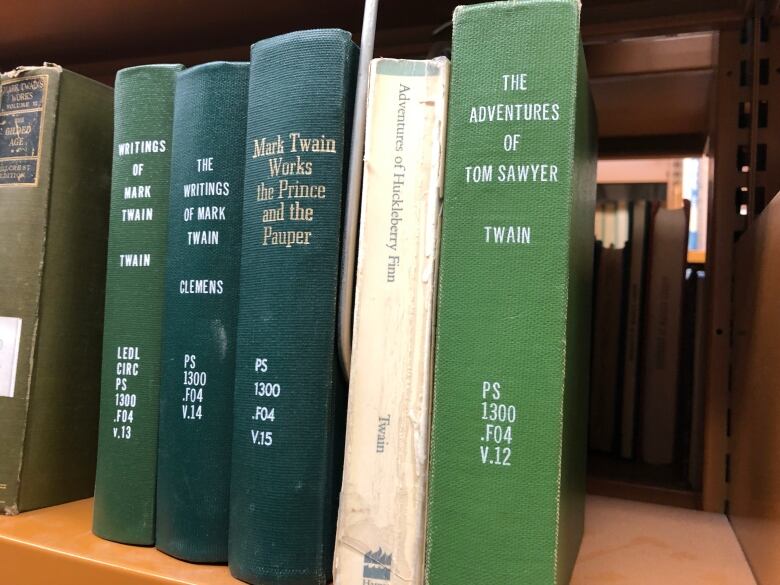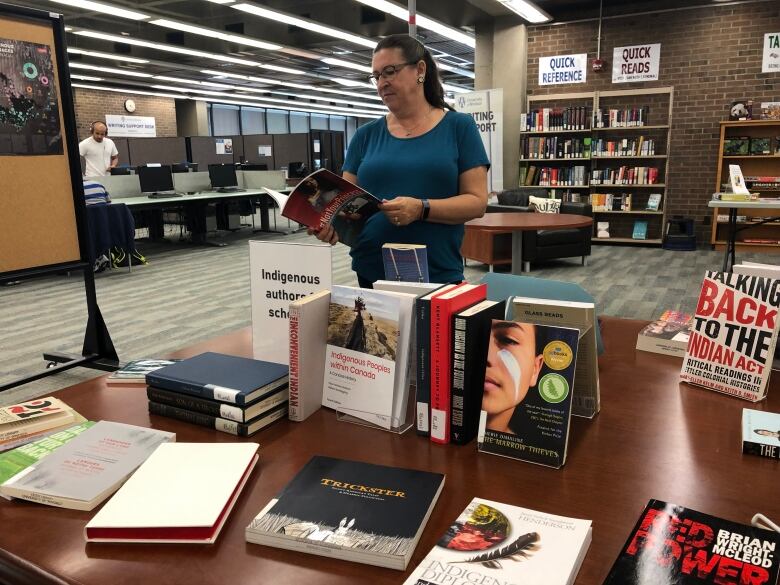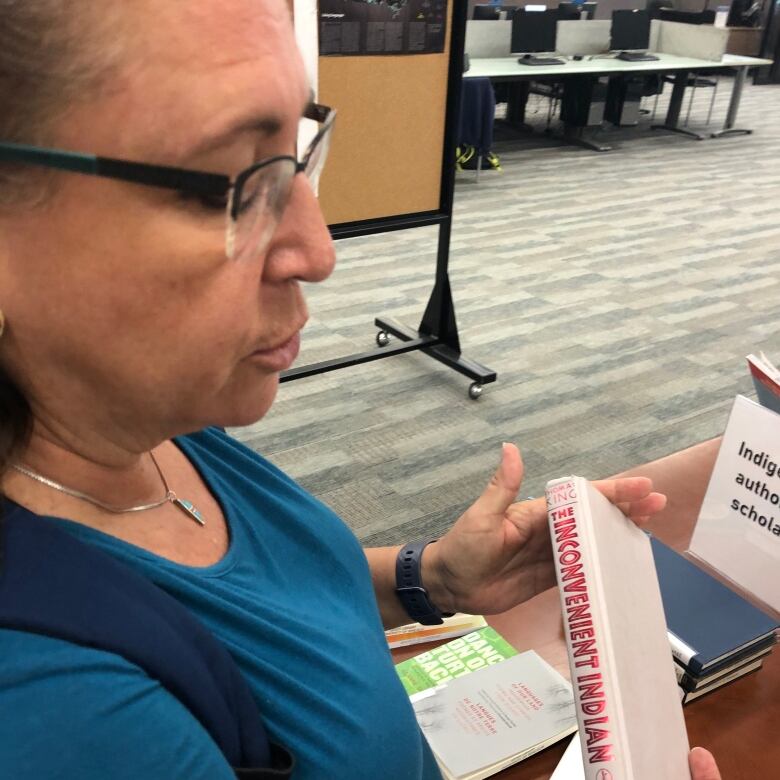Indigenous professor shakes up the English curriculum at University of Windsor
"Our stories are ancient. They simply weren't put into written form," said Sandra Muse Isaacs

Sandra Muse Isaacs's personal struggle to identify with characters inhistoric literaryclassicsinfluenced her to rewrite some of the English literature curriculum at the University of Windsor, which now reflects the abundance of Indigenous novels in Canada.
Imet with Muse Isaccs on the University of Windsor campus.
When I found her, she was waiting for me on a concrete bench, shaded by an old maple tree, just outside the university's library. I couldn't help but notice in her hands was the newest edition of Academic Matters, a magazine printed twice a year and published by the Ontario Confederation of University Faculty Associations.
It is mailed to all teachers at university.
"Every article in here is about decolonizing and indigenizing," said Professor Muse Isaacs.
Watching the professor study the magazine on campus was poetic; she has waited more than sixdecades to read indigenous material in mainstream academia.
Muse Isaacs studied at the University of Windsor but never saw herself reflected in the course material. Something she is determined to change for her students.
As we walk among the library stacks, Muse Isaacs pulls out The Adventures of Huckleberry Finn, one of the earliest books she read as a child as young as 7.
"Like everyone, I'm struck by the racism, and the N word being used but then when I got to the character of Injun Joe who is sort of the ultimate evil that hurts children, and things like that, and he's just called Injun Joe which is really derogatory," said Muse Isaacs.

Together we take the elevator, but on our way to the 3rd floor, Muse Isaacs is struck by another early literary memory; The Song of Hiawatha, by Longfellow. It is an 1855 poem taught in several English classrooms.
"People love that poem," she said before reciting a few lines:
By the shores of Gitche Gumee,
By the shining Big-Sea-Water,
At the doorway of his wigwam,
In the pleasant Summer morning...
"Hiawatha wasn't Ojibwe as he was portrayed," corrected Muse Isaacs, "Hiawatha was a sacred man of the Iroquoi."
Several earlier writings are flooded with similar inaccuracies which always miffed Sandra as early as childhood. Similarly it was her early readings by Mark Twain that really disturbed her how Indigenous people were portrayed.
"It was like reading about cartoon characters," she said while her fingers climb Mark Twain's novels looking for the Adventures of Huckleberry Finn.
"InjunJoe makes appearances ever so often and he's the ultimate bad, the ultimate evil and murderer," she said. "Mark Twain as much as I love Mark Twain criminalized and dehumanized this man. It was difficult to read this book, just as it was difficult to read Hiawatha because it was so romanticized."
These earlier pieces of writing are culturally inaccurate. But how they established stereotypes that made it to the Hollywood big screenis what Muse Isaacs points out as even more problematic.
"So what people see on the movies is what they think native people are like which is all tepees, Plain Indians, most of us are nothing like that so it was really difficult to read this stuff... It made you be frightened of native people, period."
As she flips through The Adventure of Tom Sawyer, Muse Isaacs finds Injun Joe's appearance in The Adventures of Tom Sawyer.

In Chapter 11 he makes an appearance while looking for someone. Sandra reads this excerpt:
"Injun Joe sprang to his feet, his eyes flaming with passion, snatched up Potter's knife, and went creeping, catlike and stooping, round and round the combatants, seeking an opportunity. So we just witnessed Injun Joe killing a man in cold blood," she said. "Stabbing a young man in the chest with a knife."
"Am I supposed to see myself in this? There's no one that I know, nobody in my family that was like that."
It wasn't until Muse Isaacs came to the University of Windsor as an undergraduate thatshe was able to see and read Indigenous writings.
"I had English professors here who were very open-minded, who wanted to hear my opinion about some of the early American and Canadian literature. I spent my years here as an undergrad and as a grad student presenting what is known as a Red Reading. So my Indigenous perspective of books and stories and poetry that portrayed Indians in bad ways and I did a lot of that."
Creating her own curriculum:
Professor Muse Isaacs is now creating her own curriculum at the University of Windsor, because she believes Indigenous literature hasn't been taught properly. But unlike when she was a student, there is nowa plethora of novels to pour through.
"We have to pour through tons and tons of new books because the canon of Indigenous literature in North America is the fastest growing canon in the world," said Muse Isaacs."Creating my own curriculum. I really become a part of the curriculum."
Teaching films in a proper way has also changed over the years, because filmmaking and documentary making is also really booming Indigenous people.
"We aren't talking about the old cowboy and Indian movies where they have fake Indians, you know non-natives playing Indians these are movies and documentaries that are written, produced, acted all by indigenous people," she said.
"Did you ever think you'd see this within your lifetime?" I asked.
"Not really. I thought I'd die before Indigenous writing was really recognized. And people think, wow, indigenous literature is a really new things, it's only been around since the 70's or so. Wait a minute, our stories are ancient. They simply weren't put into written form. "
As we make our way back to the ground level of the library, we stop at a table with a few books written by Indigenous authors, including Thomas King. King who has been writing novels since the 80's, he's won the 2014 Governor General's award among others. Muse Isaacs says his book, The Inconvenient Indian, is a good place for Canadians to start reading.

Here's an excerpt she read:
"When I was a kid Indians were Indians... lately Indians have became First Nations in Canada and Native Americans in the United States. But the fact of the matter is, that there has never been a good collective noun because there never was a collective to begin with."
Muse Isaacs wants nothing more than this conversation to continue, so young Indigenous girls - like she once was - can believe they are worthy of having their stories told to many.













_(720p).jpg)


 OFFICIAL HD MUSIC VIDEO.jpg)
.jpg)



























































































